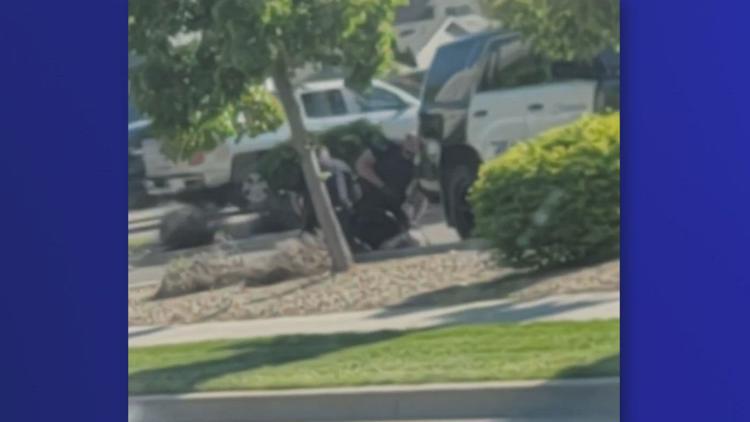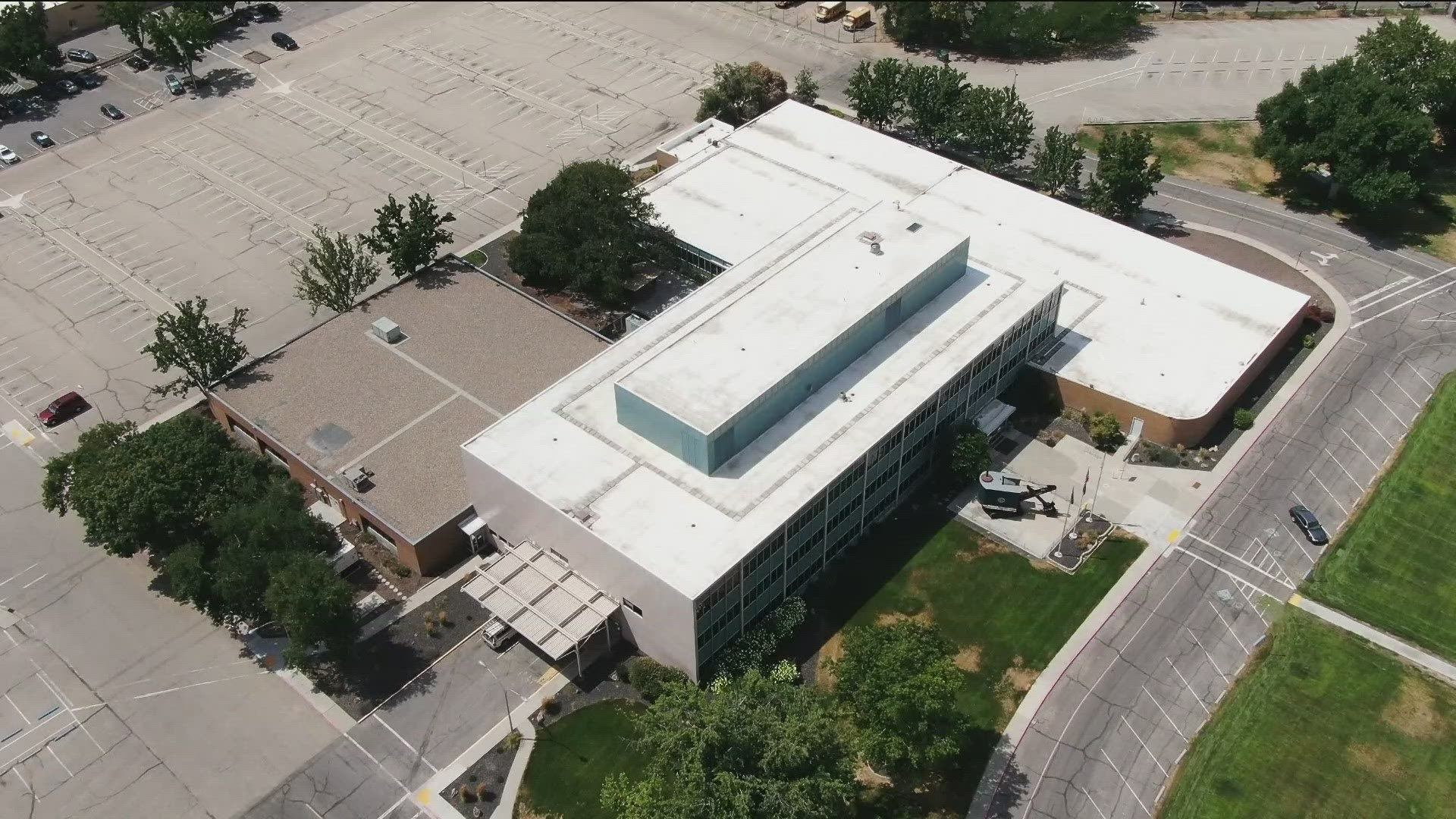MERIDIAN, Idaho — This article first appeared in the Idaho Press.
A Meridian police officer punched a man six times on May 16, in a video that was posted online the next day. But in a police report approved on May 17, the officer, Donald Heida, made little mention of the violence.
The man, 31-year-old Boise resident Colt Seward, was arrested on charges that included resisting and obstructing, drug paraphernalia, driving under the influence, possession of a controlled substance and unlawful possession of a firearm by a convicted felon. His mugshot showed a black eye and bloody lacerations on his face and head.
The Meridian Police Department declined to comment for this story “as there is an open criminal case regarding this incident.” They did release a statement after the video went online.
In the probable cause section of the police report, which details the narrative of the incident, there is no mention of the violence.
“While in the backseat of my patrol vehicle Colt slipped his handcuffs and brought them to the front of his body,” Heida wrote in the report. “While Officer McDonald and I attempted to place Colt’s hands back behind his back he pulled his hands away and elbowed me in the chest with his left elbow while only having his left hand handcuffed. Colt provided three breath samples.”
Under the people involved section, the report lists Seward with an injury of broken bones. At the very bottom of the report, one section is almost entirely redacted, except for a spot labeled how something was identified.
The Meridian Police Department said that after Heida did not violate department’s use of force policy, according to a city spokesperson.
Ben Barton, a former Moscow Police Department Reserve Officer, said he would expect to at least see the use of force in the narrative section of the report. Barton is also a professor and department chair in psychology and communication at the University of Idaho.
"I've looked at the use of force policy, the citizen video and report. It looks like some use of force was used that should have been documented," Barton said. "It should be in the report. It should be somewhere."
A big part of police work is documenting things, Barton said.
"One thing I told people when I was a reserve is that being a police officer, it's more about the flashlight and the notepad than it is about the gun and the badge," Barton said.
Meridian's use of force policy is vague on whether use of force has to be reported, although parts of the policy are redacted. When asked about when and how officers have to report force, Meridian police's spokesperson said she couldn't get the answers because the chief is out of town.
However, it does say that any officer who sees another officer use force that is potentially unreasonable “shall” report what they saw to a supervisor.
“When observing or reporting force used by a law enforcement officer, each officer should take into account the totality of the circumstances and the possibility that other law enforcement officers may have additional information regarding the threat posed by the subject,” the policy said.
In addition, anytime the “carotid control hold” is used or attempted to be used, it has to be documented in “any related reports.” This hold restricts blood flow to the brain and causes temporary unconsciousness, according to the Department of Justice.
There is body camera video of the incident, according to the police report. However, the footage will not be released until after the man's criminal case has concluded, the Meridian spokesperson said.
The report was obtained via a public records request for the results of the investigation into whether Heida violated the department's use of force policy and any related documents. The Meridian Police Department denied 38 pages but gave the Idaho Press the police report.
It's hard to know if not reporting force is normal, according to Boise State University Department of Criminal Justice Associate Professor Cody Jorgensen. However, it does happen.
"Regarding this specific incident in Meridian, it seems to me that not accurately reporting the force used, including the several punches to Seward's face, is violative of accountability and transparency," Jorgensen said in an email.
The most infamous non-report in recent years is likely the original press release for George Floyd’s death at the hands of a Minneapolis police officer in May of 2020, which made national headlines. In it, the department wrote that Floyd physically resisted officers while the video, which went viral after the fact, showed evidence contrary to that.
“Officers were able to get the suspect into handcuffs and noted he appeared to be suffering medical distress,” the Minneapolis Police Department press release said on May 25, 2020. “Officers called for an ambulance. He was transported to Hennepin County Medical Center by ambulance where he died a short time later.”
In actuality, officer Derek Chauvin kneeled on Floyd's neck for over nine minutes. Chauvin kept his knee on Floyd's neck even after Floyd was not responsive.
What followed was nationwide protests about police violence.
In the Meridian case, the department responded to the video that was posted online of the arrest.
“The Meridian Police Department takes every use of force very seriously and conducts reviews on each,” the Meridian Police Department said in a release at the time. “While the video on social media only captures part of the use of force, we are asking for the public’s patience, while we conduct our internal review of this incident.”
Social media and the prevalence of cameras has unquestionably changed policing.
“Negativity spreads like wildfire,” read a 2018 article in the FBI’s Law Enforcement Bulletin. “When a police officer conducts even slightly questionable actions, any video footage almost instantly can go viral on social media.”
In fact, almost a quarter of adult social media users said they had changed their views about a political or social issue because of social media, according to a 2020 Pew Research Center Survey. The top issues described were Black Lives Matter and police brutality and reform.
Bystander footage has sparked outrage in a number of high-profile police use of force cases, including Philando Castile’s death in 2016 in Saint Paul, Minnesota; Eric Garner’s death in 2014 in New York City; and perhaps one of the first cases, the beating of Rodney King in Los Angeles in 1991.
And PBS reported in 2016 that social media plays a “major role” in the national debate on police force.
Barton said social media and videos have changed policing a little bit. Anyone can pull out their phone and record an officer without breaking the law.
"You really shouldn't be doing anything that you wouldn't want the public seeing," Barton said. "It should not change or reset because people shouldn't be doing things they shouldn't be doing in the first place."
This article originally appeared in the Idaho Press, read more on IdahoPress.com.
Watch more Local News:
See the latest news from around the Treasure Valley and the Gem State in our YouTube playlist:



